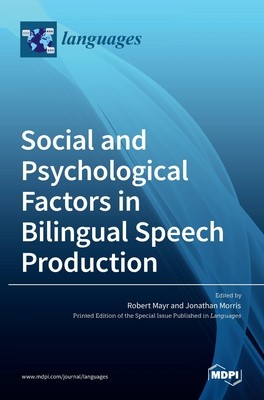
- We will send in 10–14 business days.
- Publisher: MDPI AG
- ISBN-10: 3036522778
- ISBN-13: 9783036522777
- Format: 17 x 24.4 x 2.1 cm, hardcover
- Language: English
- SAVE -10% with code: EXTRA
Social and Psychological Factors in Bilingual Speech Production (e-book) (used book) | bookbook.eu
Reviews
Description
Studies in the fields of bilingualism and second language acquisition have shown that both cognitive and affective psychological factors can influence individuals' bilingual speech production. More recently, both experimental and variationist studies of bilingual communities have examined the role of social factors on bilinguals' speech, particularly in cases of long-term language contact and minority-language bilingualism. The Special Issue brings together work on the psychological and/or social factors that influence bilingual speech production as well as work that uses different methodological frameworks. We examine the role of such factors on bilingual speech production in diverse contexts, in order to provide a more holistic account of the ways in which extra-linguistic influences may affect bilinguals' speech in one or both of their languages.
EXTRA 10 % discount with code: EXTRA
The promotion ends in 16d.18:59:08
The discount code is valid when purchasing from 10 €. Discounts do not stack.
- Publisher: MDPI AG
- ISBN-10: 3036522778
- ISBN-13: 9783036522777
- Format: 17 x 24.4 x 2.1 cm, hardcover
- Language: English English
Studies in the fields of bilingualism and second language acquisition have shown that both cognitive and affective psychological factors can influence individuals' bilingual speech production. More recently, both experimental and variationist studies of bilingual communities have examined the role of social factors on bilinguals' speech, particularly in cases of long-term language contact and minority-language bilingualism. The Special Issue brings together work on the psychological and/or social factors that influence bilingual speech production as well as work that uses different methodological frameworks. We examine the role of such factors on bilingual speech production in diverse contexts, in order to provide a more holistic account of the ways in which extra-linguistic influences may affect bilinguals' speech in one or both of their languages.


Reviews